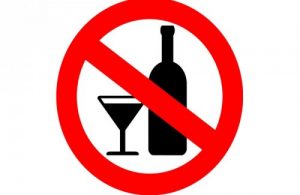Ok, It’s Time Again for Dry January
Friday, January 3rd, 2025Addiction and Recovery
By Bob Gaydos
(A favorite from last year that still applies.)
 For those looking for a New Year’s resolution that can actually be challenging to keep and potentially beneficial if done the right way, I offer some thoughts I shared when I first heard about Dry January and some new ones.
For those looking for a New Year’s resolution that can actually be challenging to keep and potentially beneficial if done the right way, I offer some thoughts I shared when I first heard about Dry January and some new ones.
You hang around with an experienced group of people for any amount of time, with any luck, you learn a few things.
I’ve been writing a column on addiction and recovery for more than 15 years. In that time, I have been fortunate to have many conversations with members of Alcoholics Anonymous who have decades of sobriety. They have freely shared some of their experience and wisdom with me.
One bit of AA wisdom goes like this: “People who don’t have a drinking problem don’t have to control their drinking.”
Hmmm. So why are social media and news feeds filled daily with stories on “Dry January”? Why the sudden interest in non-alcoholic beer and no-booze cocktails? What’s the big rush all of a sudden for, reportedly, thousands of people to decide to see if they can not partake of alcohol for the month of January? Last year, one poll said 41 percent of respondents planned to partake of Dry January. I couldn’t find a report on how well they did, but clearly, not drinking alcohol for one month at least is suddenly chic.
For what it’s worth, alcoholics, or rather, those who insist they are not alcoholics, have been taking the post-holiday challenge forever in valiant efforts to prove to themselves and (mainly) others that they can control their drinking. Often, they’ve failed. Rehab February. Others have attempted to give up drinking for Lent, for the same reason and often with the same results.
But this is different. This is people, many apparently younger people, supposedly deciding that it might be in their best interest to abstain from or at least reduce their alcohol intake, at least for the month.
Given recent reports on an upsurge in alcohol consumption (particularly by women) during the pandemic, an increase in alcohol-related deaths and a myth-busting report which concludes that “no amount of alcohol” is ever good for your health, going dry or easing up on alcohol for a month sounds like a reasonable idea for anyone.
But there are risks involved and if you’re intrigued by the idea of stopping or controlling your drinking there ought to be rules. For starters, what is your purpose? Is it, as previously mentioned, to prove you don’t have a drinking problem? If so, you need to tell other people what you’re doing so there is accountability and, crucially, protection, in case a serious alcohol problem does exist.
Going through withdrawal symptoms from avoiding alcohol on one’s own can be painful and dangerous. Be aware of the symptoms and get professional help if they begin. Your effort may have failed, but it might have saved your life.
If, on the other hand, the purpose is truly to see if life can be just as interesting and fun without alcohol always being involved, again, don’t do it alone. Get some friends involved. Plan alcohol-free activities. Try some of those fancy new alcohol-free “mocktails” the Dry January movement has spawned. If you’re really serious, maybe focus more on exercise. Try to get more sleep. See if you start to feel better physically and emotionally.
Drawing again on some AA wisdom, the key to succeeding, whatever your goal, is to be honest and realistic. Whether you’re trying to not drink for a specific month or just cut back, if you find yourself drinking or thinking you’d really like to be drinking in spite of your stated goal, by all means start over again. But be aware of any recurring pattern. There may be a problem.
On a positive note, if Dry January results in a more responsible general approach to alcohol consumption (as brewers and distillers are obliged to promote), it has to be good for society’s overall health. Excessive alcohol consumption contributes to a multitude of societal and health problems as well as highway and other accidents.
Fad or not, the movement would also go along with the effort by health agencies and providers to remove the stigma and shame often attached to alcoholism by getting rid of the word “alcoholic,” which still conjures up negative images for many people. Today, people are diagnosed with alcohol abuse disorder, mild, moderate or severe. (Sober members of AA still call themselves alcoholics with no shame attached.)
According to the National Institute on Alcohol Abuse and Alcoholism, alcohol use disorder “is a medical condition characterized by an impaired ability to stop or control alcohol use despite adverse social, occupational, or health consequences.” That’s the “drinking and trouble” connection members of AA often talk about.
On the basic issue of stopping drinking and trying to keep things simple, AA’s Third Tradition states that “the only requirement for membership is a desire to stop drinking.”
Adding that touch of reality necessary to recovery, an AA friend asked, “Who would have a desire to stop drinking other than someone who drank too much and got in trouble over it?”
With sincere hope for the success and good intentions of anyone participating in this year’s Dry January, that’s a question to keep in mind for anyone planning on a just plain February.
rjgaydos@gmail.com
Bob Gaydos is writer-in-residence at zestoforange.com.

